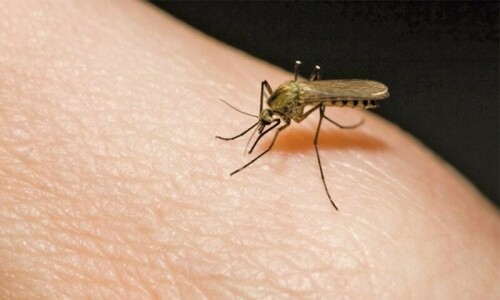PESHAWAR: After the detection of 15 suspected chikungunya cases in Mansehra district, the Khyber Pakhtunkhwa health department has ordered preventive measures against the mosquito-borne disease.
Director-general (health services) Dr Mohammad Saleem Khan has formally ordered the district health officers, public health coordinator and medical entomologist to start taking steps to prevent the infection, fearing its spread due to the recent rains.
In an advisory, he declared the detection of suspected chikungunya cases a “significant public health concern” and directed authorities to ensure the prevention and control of the disease.
An outbreak of chikungunya was reported in Karachi in 2017 that was followed by the virus’s detection in travellers from different parts of the country. The disease is now endemic in many parts of the country like dengue haemorrhagic fever.
Health official fears spread of infection due to recent rains.
The DG pointed out that in view of the “hyperactive season of mosquitoes and previous seasonal trends of chikungunya,” it was imperative to undertake preventive measures against it while staying vigilant to pick suspected cases, confirming the disease, and taking steps to interrupt further transmission.
He added that the advisory he issued was meant to sensitise health authorities to further strengthen and improve the level of preparedness for prevention and control of chikungunya, which was caused by chikungunya virus and transmitted by aedes mosquitoes to people.
According to him, chikungunya carries some clinical signs identical with dengue and can be misdiagnosed in areas where dengue is common, but it is rarely fatal without any significant hemorrhagic manifestations.
“The proximity of mosquito breeding sites to human habitation is a significant risk factor and the viruses can circulate in the same area with dengue and cause occasional co-infections in the same patient,” the DG said in the advisory.
Meanwhile, director (public health) Dr Irshad Roghani said samples from the suspected chikungunya cases were sent to the Public Health Reference Lab for testing.
He said the infection’s transmission occurred mostly during or soon after the rainy season.
The director said mother-to-child transmission had also been reported in women who developed the disease in a week before delivery.
According to him, spontaneous abortions are rarely reported following maternal chikungunya virus infection but there is no evidence of the virus transmission through breast milk.
He said physicians in hospitals had been informed that the disease is characterised by a sudden onset of fever, chills, headache, myalgia, nausea, photophobia, incapacitating joint pain and petechial or maculopapular rash.
“Once a person has recovered from the disease, he or she is likely to have a lifelong immunity against subsequent chikungunya virus infections. Risk factors for more severe disease include in the last weeks of pregnancy for the neonates exposed intrapartum, while the older and those co-morbidity can experience rheumatoid arthritis syndrome,” he said.
The advisory said there was no specific treatment for the infectious disease, with the doctors mainly relying on the management of symptoms.
“Neither any vaccine nor any anti-viral is available for prevention and treatment of chikungunya.”
According to the advisory, patients require plenty of rest and fluids to prevent dehydration, while symptomatic treatment is advised preferably with Acetaminophen.
It asked suspected or confirmed cases not to take aspirin and other non-steroidal anti-inflammatory drugs and called for the elimination of mosquito breeding sites, removal of all open containers with stagnant water in and surrounding houses on a regular basis, and sprinkling of larvicides in water pools.
Published in Dawn, September 17th, 2024















































Dear visitor, the comments section is undergoing an overhaul and will return soon.